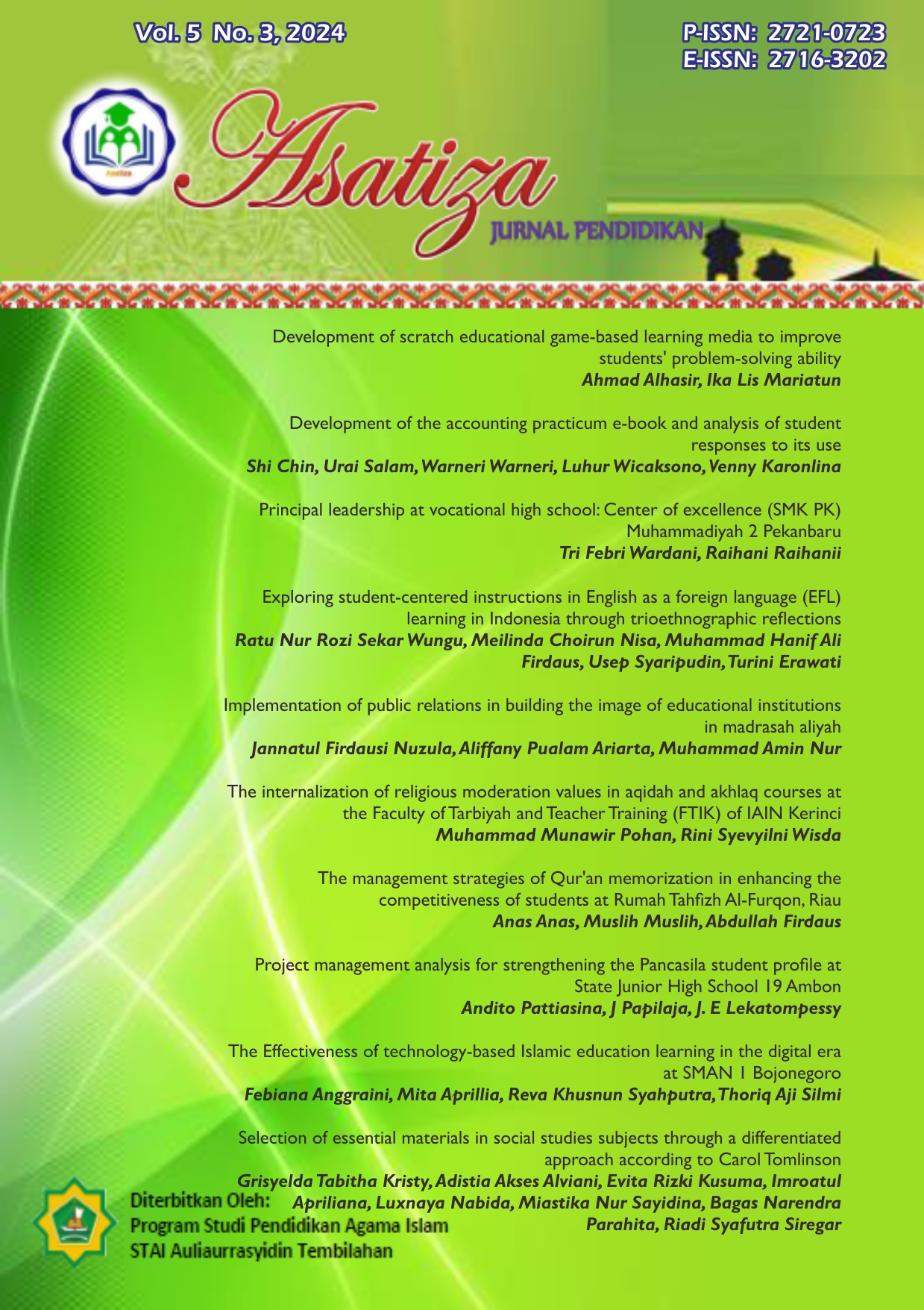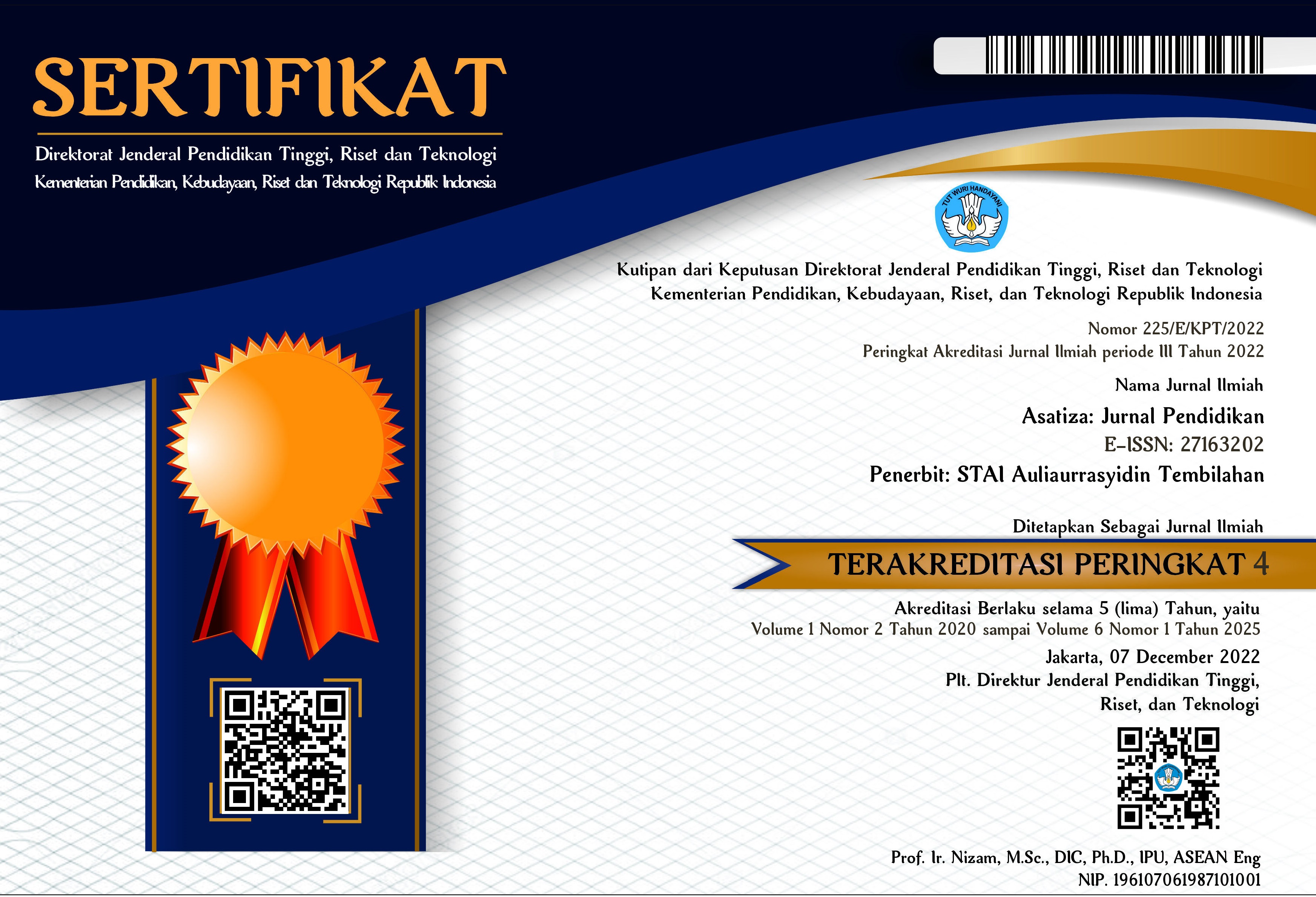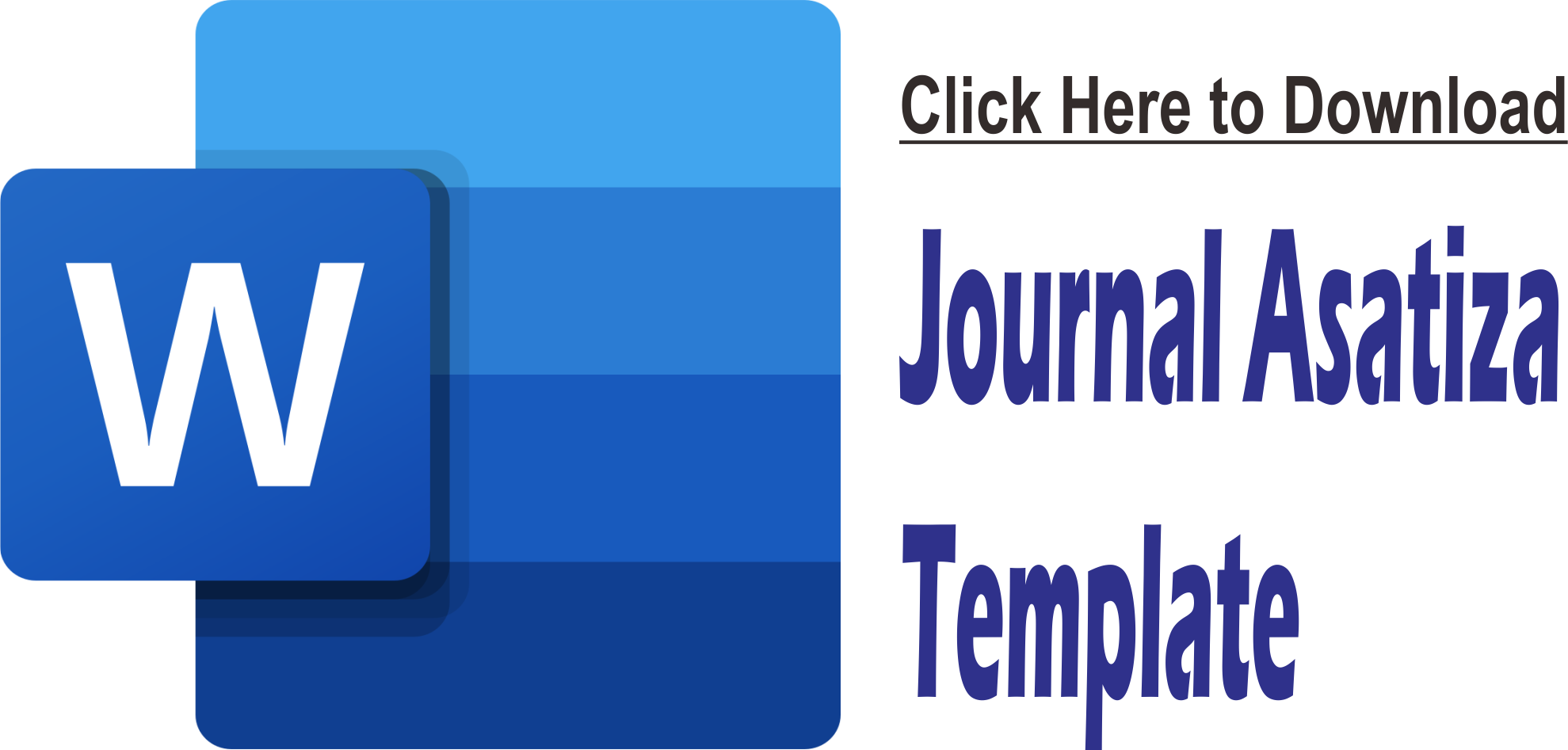Development of scratch educational game-based learning media to improve students' problem-solving ability
DOI:
https://doi.org/10.46963/asatiza.v5i3.1877Keywords:
Scratch learning media, Problem-solving, ADDIEAbstract
This study develops Scratch educational game-based learning media to improve students' problem-solving skills in economics subjects regarding financial institutions in class X MA An-Nidhomiyah. The research method used is Research and Development (R&D) with the ADDIE model (Analysis, Design, Development, Implementation, Evaluation). Data were collected through questionnaires, observations, interviews, and tests, and analyzed descriptively. The research subjects were 16 grade X students. The results showed that this learning media was very feasible to use, with a validation score of 4.5 from the material expert, 4.6 from the teacher, and the media expert's assessment showed feasibility. In addition, this media is proven effective in improving students' problem-solving skills, with a Gain Score of 1.5 which is in the high category.
Downloads
References
Aini, K. A., Lis Mariatun, I., & Sholeh, Y. (2023). Pengembangan media pembelajaran berbasis blog untuk meningkatkan motivasi belajar x SMAN 1 Tanjung Bumi. Jurnal Pendidikan Ekonomi, 3(2), 423–432. https://doi.org/10.31932/jpe.v8i2.2543
Anggraeni, N. A., & Jailani, J. (2022). Peningkatan kemampuan problem solving dan collaboration siswa melalui model pembelajaran discovery learning. AKSIOMA: Jurnal Program Studi Pendidikan Matematika, 11(4), 3736. https://doi.org/10.24127/ajpm.v11i4.5998
Arfiansyah, L. P., Akhlis, I., & Susilo, S. (2019). Pengembangan media pembelajaran berbasis scratch pada pokok bahasan Alat Optik. UPEJ Unnes Physics Education Journal, 8(1), 66-74. https://doi.org/10.15294/upej.v8i1.29515
Fahlevi, R., & Yuliani, A. (2021). Pengembangan game edukasi cermat berbasis android untuk meningkatkan keterampilan problem solving siswa SMA pada materi barisan dan deret geometri. Jurnal Pembelajaran Matematika Inovatif, 4(5), 1191–1204. https://doi.org/10.22460/jpmi.v4i5.1191-1204
Intana, N. M., Akhlis, I., & Hardyanto, W. (2018). Pengembangan multimedia pembelajaran fisika berbasis scratch pada pokok bahasan hukum oersted. UPEJ Unnes Physics Education Journal, 7(2), 1-8. https://doi.org/10.15294/upej.v7i2.27461
Irawan, E., Kusumah, Y. S., & Saputri, V. (2023). Pengembangan multimedia interaktif menggunakan scratch: Solusi pembelajaran di era society 5.0. AKSIOMA: Jurnal Program Studi Pendidikan Matematika, 12(1), 36-50.
https://doi.org/10.24127/ajpm.v12i1.6226
Isnaini, L., Agustina, D. K., & Sulistiana, D. (2021). Pengembangan game edukasi animalia berbasis android untuk siswa kelas x SMA/MA. Biodidaktika: Jurnal Biologi Dan Pembelajarannya, 17(2), 36–44. http://dx.doi.org/10.30870/biodidaktika.v17i2.16496
Jaser, S. N., Sesmiarni, Z., Syawaluddin, S., & Yusri, F. (2023). Perancangan media pembelajaran informatika berupa game edukasi menggunakan apk scratch di SMAN 4 Pariaman. JATI (Jurnal Mahasiswa Teknik Informatika), 7(3), 1757–1763. https://doi.org/10.36040/jati.v7i3.7671
Mariatun, I. L. (2022). Meningkatkan aktivitas belajar mata pelajaran IPS melalui metode pembelajaran think pair share pada kelas vii MTS Manbaul Hikam. JISIP (Jurnal Ilmu Sosial dan Pendidikan), 6(4). 2900-2904. http://dx.doi.org/10.58258/jisip.v6i4.4430
Martanti, A. P., Hardyanto, W., & Sopyan, A. (2013). Pengembangan media animasi dua dimensi berbasis java scratch materi teori kinetik gas untuk meningkatkan pemahaman konsep siswa SMA. UPEJ Unnes Physics Education Journal, 2(2). 19-25. https://doi.org/10.15294/upej.v2i2.2661
Nur, F. R., Dwi, P. S., Pratiwi, A., Jadidi, & Sahputra, D. (2023). Peran guru BK dalam mengatasi kesulitan belajar siswa pecandu game online di SMA Negeri 4 Binjai. Jurnal Ilmiah Pendidikan, 9(3), 312–316. https://doi.org/10.5281/zenodo.7545960
Sembiring, T. Y., Hutauruk, A. J., Marbun, Y., & Manalu, J. B. (2022). Pengembangan media pembelajaran scratch berbasis kearifan lokal pada materi himpunan. Jurnal Curere, 6(2), 109-119. http://dx.doi.org/10.36764/jc.v6i2.852
Sugiyono. (2017). Metodologi Penelitian Kuantitatif, Kualitatif, dan R&D (Ke-26). Alfabeta, CV.
Susino, S. A., Destiniar, D., & Sari, E. F. P. (2023). Pengaruh model pembelajaran problem based learning (pbl) terhadap kemampuan pemecahan masalah matematis siswa kelas x SMA. Jurnal Cendekia: Jurnal Pendidikan Matematika, 8(1), 53-61. https://doi.org/10.31004/cendekia.v8i1.2918
Yulianisa, A., & Sudihartinih, E. (2022). Pengembangan media pembelajaran matematika materi perkalian aljabar berbasis aplikasi scratch. Jurnal Pendidikan Matematika Universitas Lampung, 10(2), 142-156. https://doi.org/10.23960/mtk/v10i2.pp142-156
Yusuf, M. (2018). Pengantar Ilmu Pendidikan (D. Ilham (ed.); Pertama). Lembaga Penerbit Kampus IAIN Palopo.
Downloads
Published
Issue
Section
License
Copyright (c) 2024 Ahmad Alhasir, Ika Lis Mariatun

This work is licensed under a Creative Commons Attribution-ShareAlike 4.0 International License.
Authors who publish with this journal agree to the following terms:
1. Copyright on any article is retained by the author(s).
2. The author grants the journal, right of first publication with the work simultaneously licensed under a Creative Commons Attribution shareAlike 4.0 International License that allows others to share the work with an acknowledgment of the work’s authorship and initial publication in this journal.
3. Authors are able to enter into separate, additional contractual arrangements for the non-exclusive distribution of the journal’s published version of the work (e.g., post it to an institutional repository or publish it in a book), with an acknowledgment of its initial publication in this journal.
4. Authors are permitted and encouraged to post their work online (e.g., in institutional repositories or on their website) prior to and during the submission process, as it can lead to productive exchanges, as well as earlier and greater citation of published work.
5. The article and any associated published material is distributed under the Creative Commons Attribution-ShareAlike 4.0 International License











2.png)



